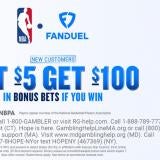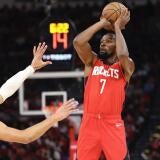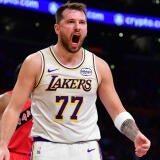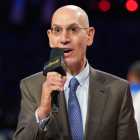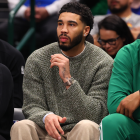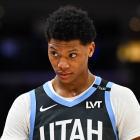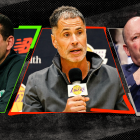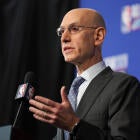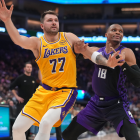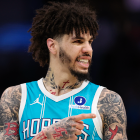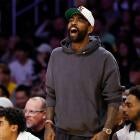2024 NBA Draft: KJ Simpson is a small guard, but teams that pass on him could be making a big mistake
The 'fearless' playmaker out of Colorado explains why you shouldn't fixate on his height

Bryan Cantwell, the head coach of Chaminade College Preparatory in West Hills, California, estimates that he's talked to 12 to 15 NBA teams about KJ Simpson. They all ask similar questions. About his work ethic, his desire to compete, his ability to communicate with teammates. "It's all positive stuff," Cantwell said. These conversations aren't particularly long, as "they've all got so much information on him already." They've seen all the film, and they know all the numbers.
Simpson's stats in his junior year at Colorado suggest he should at least hear his name called on Wednesday, during the first round of the 2024 NBA Draft. He averaged 19.7 points, 5.8 rebounds, 4.9 assists and 1.6 steals. He shot 43.4% from 3-point range (and 41.7% on 3s off the dribble, per Synergy Sports). He shot 58.5% at the rim. "Everything increased," Simpson said. "Everything, literally every category." But there is one number that he cannot change: His height.
At the draft combine in May, Simpson measured at 6-foot-0.25 without shoes. This is "the only thing that is holding anybody back," Cantwell said. The NBA is not in its short-king era, as there is more switching than ever before and, in the playoffs, offenses relentlessly hunt mismatches. Less skilled, longer-limbed prospects often get the benefit of the doubt because they can cover more ground and defend multiple positions.
Ahead of this year's draft, Simpson's status is all over the place. The Ringer's latest mock has him going to the Minnesota Timberwolves at No. 27 and the two-round mock from Kyle Boone here at CBS Sports has him going to the Memphis Grizzlies at No. 57. Some draftniks have him higher on their big boards than others, but even The Athletic's Sam Vecenie, who ranked him 53rd, wrote, "If he were 6-3, he'd be a clear first-round pick."
Around the league, though, there are several 6-2-and-under success stories that double as major misses for talent evaluators. T.J. McConnell of the Indiana Pacers and Jose Alvarado of the New Orleans Pelicans, two of the best reserves in the NBA, went undrafted. So did Fred VanVleet, who won a championship in 2019 playing alongside Kyle Lowry and will make $42.8 million next season with the Houston Rockets. Jalen Brunson, who finished fifth in MVP voting this past season (just like former No. 60 pick Isaiah Thomas did in 2017), was drafted No. 33 in 2018. Brunson's backup, Miles "Deuce" McBride, went 36th in 2021.
For executives, it might feel risky to take "undersized" guards in the first round, but there is risk in passing on them, too. The teams that picked Tyrese Maxey (No. 21 in 2020) and Immanuel Quickley (No. 25 in 2020) surely do not regret it. Players of their stature do not always exceed expectations or even stick in the league, but, sometimes, it is clear that decision-makers were blinded by the height. In Simpson's case, if that's what teams are focused on, what are they missing?
"Honestly, everything," Simpson said.
Fifteen games in, Simpson's sophomore season at Colorado was going smoothly. Per-minute, he was scoring even more than he would as a junior, albeit not quite as efficiently, and he was shooting and rebounding much better than he had as a freshman. On New Year's Eve, though, late in a game against Cal, he turned his ankle. Then he got food poisoning. He missed one game, and when he returned to the lineup on Jan. 7, he wasn't right. In 14 games after the ankle injury, Simpson's production dipped dramatically. He missed 44 of his 52 3-points attempts.
It turned out that it wasn't just the ankle that was limiting him, although Simpson said in retrospect that he "came back too early" from the injury. After he got over the food poisoning, he was still not feeling well. He had headaches, he said, and "couldn't eat, couldn't drink nothing." At one point, he thought he must have a concussion. Simpson said that he "felt obligated to go out there as a leader, to continue to play," but when he wasn't on the court, he was usually asleep.
"If I didn't have Tylenol in my system, I wasn't myself, I was just drowsy," Simpson said. "And I come to find out I was playing with mono for a month-and-a-half. No one knew."
By the time he was diagnosed with mono and shut down for the season, Colorado only had five games left on the schedule.
"It was dangerous," Simpson said. "My spleen was enlarged. It was double the size it was supposed to be, so if I would have got hit, it would've ruptured. And I didn't know."
Now, Simpson loves when he's asked about what happened that season, even though "it was real scary" at the time. "Looking back," he said, "I'm so grateful that everything happened because, in my eyes, me getting mono was a way for me to rest my ankle that I never healed from that season." In the summer that followed, he spent most of his time in his high school gym. Sometimes, his girlfriend, his mother, his father or Cantwell would be in there with him. Other times, "I just worked myself out," he said, using The Gun, a shooting machine that rebounds the ball and fires it back to you.
Simpson said that the whole ordeal "drove a hunger in me to go out there and prove to the world, 'I'm more than what you guys think I am.'" He said that it "helped me mature as a person and helped me show appreciation for basketball." Coming out of his sophomore year, he was well aware that his shooting percentages, assist-to-turnover ratio and level of consistency needed to improve. When they all did, "everyone was so shocked about it," he said, "but I knew it was going to happen."
Simpson's father, Kenneth Simpson Sr., won three state titles at Vashon High School in St. Louis and is in the Missouri Southern Athletics Hall of Fame, facts that Simpson proudly relayed when asked about his own basketball origin story. The elder Simpson "didn't force me to play basketball," he said, but "introduced me to it." An only child, Simpson said he gravitated to sports "because that was my way of having brothers." One day, in fourth grade, his basketball and baseball practices were scheduled at the same time. His mother, Patricia Cornejo, told him he had to choose.
"Ever since that day, I was like, you know what, I think I just want to stick with basketball," Simpson said.
Simpson said he "always loved it, I always had the passion, but I didn't take it serious" until middle school, at which point he realized that he could "do some special things out here that other people my age can't really do." That was when Kenneth Sr. "pushed me," he said, and "gave me all his knowledge." He called his dad "the best mentor, best idol, best person I could look up to and best coach I ever had."
Simpson has played bigger than his height "all my life," he said, and he credits this to his father. In college, Kenneth Sr., a 6-foot-5 forward, averaged 19.3 points and 8.6 rebounds.
"The way my dad taught me to play basketball, he just taught me to play all-around," Simpson said. "So it wasn't just going out there and scoring. It was defending, it was getting rebounds, it was obviously passing, diving on the floor, being a great teammate, being a great leader."
He wasn't much of a jump shooter right away, but that's because "he would always blow by everybody, there was no reason for him to ever shoot 3s when he was younger," Cantwell said. Simpson expanded his range over time, and Cantwell saw his playmaking develop, too. "By his senior year, I remember a couple games where he played and he had like two shot attempts in the first half, while we're winning the games," Cantwell said. This was because Chaminade's opponents were entirely "focused on trying to stop him," even if it meant sending extra defenders. Simpson was happy to find the open man.
When Simpson got to college, "I was probably harder on him than any guard that I've coached at Colorado," Buffaloes coach Tad Boyle said. Simpson was succeeding McKinley Wright IV, one of the best guards in the history of the program, and Boyle would "would throw McKinley Wright in his face a little bit." Boyle challenged him to "help us like McKinley helped us," to be a leader right away and to help the team when he wasn't scoring.
"I did it to piss him off 'cause he is so competitive," Boyle said.
This year, Boyle apologized to Simpson -- and Kenneth Sr. -- because "I probably did that more than I should have," Boyle said. Simpson did respond to those challenges, though. After three years, Boyle is sure that he is "NBA ready, mentally and physically," like Derrick White and Spencer Dinwiddie were when they left Colorado.
"He's done a great job with his body, he doesn't party, he doesn't drink, he doesn't smoke," Boyle said. "He acts like a pro, even though he's been in college, and that's very unusual."
Boyle said that, if he had to use one word to describe Simpson, "it'd be 'fearless.'" He said that Simpson "doesn't care who he's going against or what their name is or how highly they're ranked or how much size he might be giving away." Boyle often says, though, that a player's greatest strength is his greatest weakness. For Simpson, this meant reining in some of his more ambitious rim attacks.
Boyle loved that Simpson was "not afraid of anything or anybody," he said, "but that can get you into the trouble as a 6-foot point guard when you get in the middle of the lane and you leave your feet and there's 7-footers all around. You know, it's like, 'Oh, shit, what do I do now?' But he learned that, 'Hey, I can't do that. When I drive in there, I gotta play off two feet. I gotta not always try to score over everybody.' Sometimes kicking it out or dumping it off is the right play to make."
Simpson's improved efficiency is a testament to all the work he did on his shot, but it's also a testament to his shot selection. As fast as he is in the open court, he has also learned how to take his time in the pick-and-roll and change gears. He considers himself a "point guard first," but he understands how to play off the ball, too. In interviews with NBA teams, he compared himself to Andrew Nembhard, the crafty and versatile Indiana Pacers guard. Simpson has respected Nembhard since they played against each other in high school, and he started using the comp prior to Nembhard's offensive explosion in the Eastern Conference finals. When that happened, Simpson was pleased to see it. He said it gave him even more confidence.
"He's really unselfish, makes great decisions," fellow Buffaloes prospect Cody Williams said. "He's one of those guys where, you put him in the game, you don't have to worry about him making stupid plays, you don't have to worry about him turning the ball over. Everything he does is professional."
A LAST SECOND WINNER!
— CBS Sports (@CBSSports) March 22, 2024
No. 10 @CUBuffsMBB UPSETS No. 7 @GatorsMBK 🚨 pic.twitter.com/L3FiGvLqcy
Four months ago, Boyle lamented that Simpson was "playing like an All-American" but got "no national love at all, which really pisses me off." Boyle stands by this, and suggested that part of the reason he didn't get more attention is that "our games were played late at night and people didn't see him." The Pac-12 "was obviously in decline this year, not necessarily from a talent standpoint, but from an exposure standpoint," Boyle said. Simpson had plenty of eyeballs on him, though, when he made the game-winning jumper to beat Florida in the first round of the NCAA Tournament. And at the draft combine, he again took center stage.
This website described his first scrimmage in Chicago as a "masterclass performance." The Athletic's John Hollinger, a former Memphis Grizzlies executive, called him the best player on the court, adding that he showed why he should have won Pac-12 Player of the Year. After his second scrimmage, ESPN's Jonathan Givony wrote that his passing and creativity had helped his draft stock. Simpson said that he wanted to show "people who couldn't watch the Pac-12 Network at a certain time what I was doing all year."
More specifically, Simpson wanted to "show them not only can I score, pass and rebound -- do all those things that show up on the stat sheet -- but pick up full court, 94 feet, after we score," he said. "Get through ball screens. Make sure I'm being a vocal leader, picking guys up, encouraging guys." That he also recorded the best lane agility time and a 40.5-inch vertical didn't hurt. But until he's drafted, it will be unclear exactly how much any of it helped.
Simpson said that he understands "the narrative around being a small guard." He just doesn't think his height is the most important thing about him. (One thing he'd like people to know, by the way: He's Mexican on his mother's side. "Imagine me and Jaime [Jaquez Jr.] on the same [national] team, that would be crazy," he recalled telling her.) While Simpson is three inches shorter than Nembhard, he's only an inch-and-a-half shorter than fellow prospect Reed Sheppard, who is widely projected to be picked near the top of the draft. Simpson has a longer wingspan than Sheppard.
"I don't really think his size is going to be a problem," Williams said. "I mean, there's a lot of guys in the league that are small. Jalen Brunson's not as tall as Kevin Durant."
Tristan Da Silva, another prospect out of Colorado, said that NBA teams should be "licking their chops trying to get him." Simpson has "got that fight in him," Da Silva said. "He's a dog. He takes care of his body, is in the gym all the time. He's someone that everyone on the team loves."
"My height is my height," Simpson said. "I'm not going to sit here and complain about it. Everyone always says if I was taller, my ceiling would be just through the sky, it just would be crazy. But obviously I feel like I wouldn't be here if I didn't have the certain edge that I did. And my height would have nothing to do with that. I could be 6-7, I could be 5-11, I could be 6-2, it doesn't matter. I feel like the reason why I got here is because of my hard work and my heart."
To Cantwell, it's important that Simpson led a team whose tallest player was 6-foot-3 to a Division 1 CIF championship. "That is very rare," Cantwell said. "That doesn't happen." He said Simpson is "not a regular kid," as he's unusually loyal and "addicted" to working on his game. He believes that any team that drafts Simpson will "realize right away that they got a winner." This is why, when people from NBA teams bring up his height, it can be tiresome.
"I'm like, 'Do you want a guy who's going to compete, or do you want a guy who's tall?'" Cantwell said. "'I don't know what you're looking for.'"


